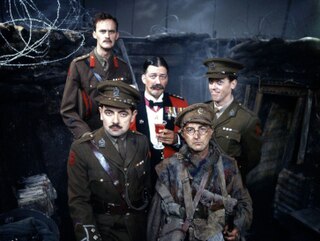
Blackadder is a series of four period British sitcoms, plus several one-off instalments, which originally aired on BBC1 from 1983 to 1989. All television episodes starred Rowan Atkinson as the antihero Edmund Blackadder and Tony Robinson as Blackadder's dogsbody, Baldrick. Each series was set in a different historical period, with the two protagonists accompanied by different characters, though several reappear in one series or another, e.g., Melchett, Lord Percy Percy / Captain Darling and George.

Edmund Blackadder is the single name given to a collection of fictional characters who appear in the BBC mock-historical comedy series Blackadder, each played by Rowan Atkinson. Although each series is set within a different period of British history, all the Edmund Blackadders in the franchise are part of the same familial line. Each character also shares notable personality traits and characteristics throughout each incarnation. In a 2001 poll conducted by Channel 4, Edmund Blackadder was ranked third on their list of the 100 Greatest TV Characters.

The Black Adder is the first series of the BBC sitcom Blackadder, written by Richard Curtis and Rowan Atkinson, directed by Martin Shardlow and produced by John Lloyd. The series was originally aired on BBC 1 from 15 June 1983 to 20 July 1983, and was a joint production with the Australian Seven Network. Set in 1485 at the end of the British Middle Ages, the series is written as a secret history which contends that King Richard III won the Battle of Bosworth Field, only to be unintentionally assassinated by his nephew's son Edmund and succeeded by said nephew, Richard IV, one of the Princes in the Tower. The series follows the exploits of Richard IV's unfavoured second son Edmund in his various attempts to increase his standing with his father and, in the final episode, his quest to overthrow him.

Blackadder II is the second series of the BBC sitcom Blackadder, written by Richard Curtis and Ben Elton, which aired from 9 January 1986 to 20 February 1986. The series is set in England during the reign of Queen Elizabeth I (1558–1603), and sees the principal character, Edmund, Lord Blackadder, as a Tudor courtier attempting to win the favour of the Queen while avoiding execution by decapitation, a fate that befell many of her suitors.

Blackadder the Third is the third series of the BBC sitcom Blackadder, written by Richard Curtis and Ben Elton, which aired from 17 September to 22 October 1987. The series is set during the Georgian Era, and sees the principal character, Mr. E. Blackadder, serve as butler to the Prince Regent and have to contend with, or cash in on, the fads of the age embraced by his master.

Blackadder's Christmas Carol, a one-off episode of Blackadder, is a parody of Charles Dickens' 1843 novella A Christmas Carol. It is set between Blackadder the Third (1987) and Blackadder Goes Forth (1989), and is narrated by Hugh Laurie. Produced by the BBC, it was first broadcast on BBC1 on 23 December 1988.

Blackadder: Back & Forth is a 1999 British science fiction comedy short film based on the BBC period sitcom Blackadder that marks the end of the Blackadder saga. It was commissioned for showing in the specially built SkyScape cinema erected southeast of the Millennium Dome on the Greenwich peninsula in South London. The film follows Lord Edmund Blackadder and his idiotic servant, Baldrick, on a time travel adventure that brings the characters into contact with several figures significant to British history.

"The Black Adder" is the pilot episode of the BBC television series Blackadder. Taped on 20 June 1982, it features the original incarnation of the character Edmund Blackadder, played by Rowan Atkinson. Following this pilot, The Black Adder eventually went into production and the first six-part series was broadcast in 1983, but with a number of changes to the casting, characterisation and plot; while the transmitted series was set in 1485 and the years following the Battle of Bosworth Field, this untransmitted pilot was set in 16th century, apparently during the Elizabethan Era.
"Bells" is the first episode of the BBC sitcom Blackadder II, the second series of Blackadder, which was set in Elizabethan England from 1558 to 1603. Although "Bells" was the first to be broadcast on BBC1, it was originally destined to be the second episode.
"Chains" is the final episode of the BBC sitcom Blackadder II, the second series of Blackadder, which was set in Elizabethan England from 1558 to 1603. Power-mad and self-professed "master of disguise", Prince Ludwig the Indestructible kidnaps Lord Blackadder and Lord Melchett. They escape his clutches but Prince Ludwig infiltrates the palace during a fancy dress ball. The episode was recorded 14 July 1985.
"Beer" is the fifth episode of the BBC sitcom Blackadder II, the second series of Blackadder, which was set in Elizabethan England from 1558 to 1603. In the episode, an embarrassing incident with a turnip, an ostrich feather and a fanatically Puritan aunt leads to a right royal to-do in the Blackadder household. The episode marks Miriam Margolyes's second and Hugh Laurie's first ever Blackadder appearance with Laurie going on to appear in every subsequent episode of the show.
"Money" is the fourth episode of the BBC sitcom Blackadder II, the second series of Blackadder, which was set in Elizabethan England from 1558 to 1603.
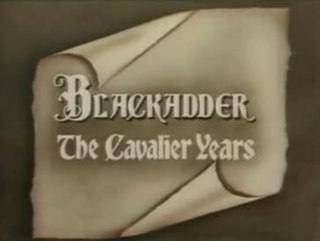
Blackadder: The Cavalier Years is a 15-minute one-off edition of Blackadder set during the English Civil War, shown as part of the first Comic Relief Red Nose Day on BBC1, broadcast on Friday 5 February 1988. The show featured Warren Clarke as a guest star.

"The Foretelling" is the first episode of the BBC sitcom The Black Adder, the first series of the long-running comedy programme Blackadder. It marks Rowan Atkinson's debut as the character Edmund Blackadder, and is the first appearance of the recurring characters Baldrick and Percy. The comedy actor Peter Cook guest stars as King Richard III.

"Born to Be King" is the second episode of The Black Adder, the first series of the BBC sitcom Blackadder. Set in late 15th-century England, the episode takes a humorous look at rivalries with the Kingdom of Scotland and centres the dramatic tension on the doubts cast over parentage of the lead character, Prince Edmund, Duke of Edinburgh.
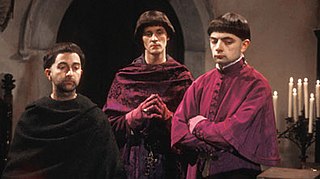
"The Archbishop" is the third episode of the first series of the BBC sitcom Blackadder. It is set in England in the late 15th century, and follows the exploits of the fictitious Prince Edmund as he is invested as Archbishop of Canterbury amid a Machiavellian plot by the King to acquire lands from the Catholic Church. Most of the humour in the episode relies on religious satire.
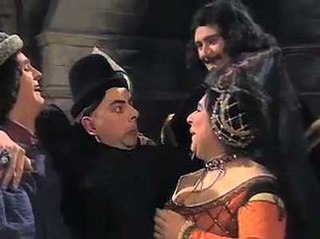
"The Queen of Spain's Beard" is the fourth episode of season one in The Black Adder, a BBC's historical comedy franchise. Set in England, during a fictional historical era of the late 15th-century, the episode parodies the practice of intermarriage between the royal houses of European powers - which was a genuine and significant characteristic of European politics at that time. Its bawdy humour also deals with taboos surrounding premarital sex, gay stereotypes and the practice of child marriage.
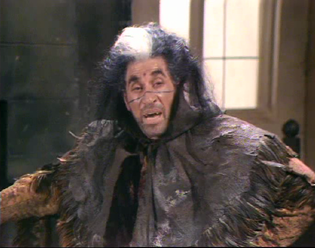
"Witchsmeller Pursuivant" is the fifth episode of the first series of the BBC sitcom Blackadder. It is set in England in the late 15th century and centres on the fictitious Prince Edmund, who finds himself falsely accused of witchcraft by a travelling witch-hunter known as the Witchsmeller Pursuivant. The story satirises mediaeval superstition and religious belief.

Baldrick is the name of several fictional characters featured in the long-running BBC historic comedy television series Blackadder. Each one serves as Edmund Blackadder's servant and sidekick and acts as a foil and arguably the best friend of the lead character. Each series of Blackadder is set in a different period in British history, and each Baldrick character is a descendant of the Baldrick from the preceding series. Just as Blackadder exists in many incarnations throughout the ages, so does Baldrick; whenever there is a Blackadder there is a Baldrick serving him. They are all portrayed by Sir Tony Robinson.
















